沪教牛津版八上练习及答案
- 格式:docx
- 大小:75.76 KB
- 文档页数:14
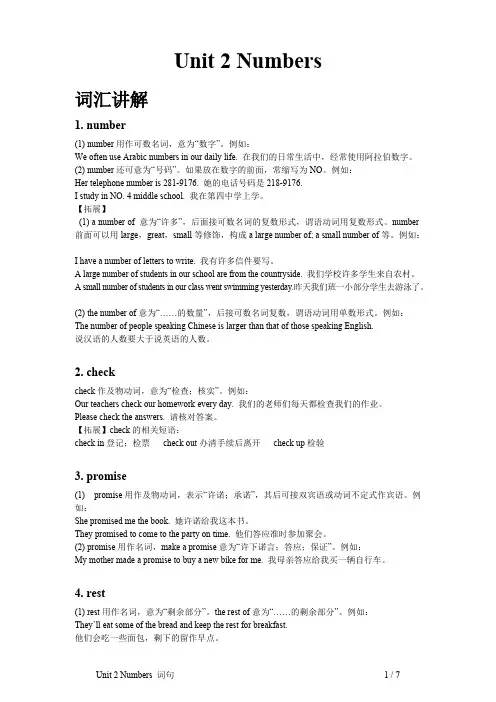
Unit 2 Numbers词汇讲解1. number(1) number用作可数名词,意为“数字”。
例如:We often use Arabic numbers in our daily life. 在我们的日常生活中,经常使用阿拉伯数字。
(2) number还可意为“号码”。
如果放在数字的前面,常缩写为NO。
例如:Her telephone number is 281-9176. 她的电话号码是218-9176.I study in NO. 4 middle school. 我在第四中学上学。
【拓展】(1) a number of 意为“许多”,后面接可数名词的复数形式,谓语动词用复数形式。
number前面可以用large,great,small等修饰,构成a large number of; a small number of等。
例如:I have a number of letters to write. 我有许多信件要写。
A large number of students in our school are from the countryside. 我们学校许多学生来自农村。
A small number of students in our class went swimming yesterday.昨天我们班一小部分学生去游泳了。
(2) the number of意为“……的数量”,后接可数名词复数,谓语动词用单数形式。
例如:The number of people speaking Chinese is larger than that of those speaking English.说汉语的人数要大于说英语的人数。
2. checkcheck作及物动词,意为“检查;核实”。
例如:Our teachers check our homework every day. 我们的老师们每天都检查我们的作业。
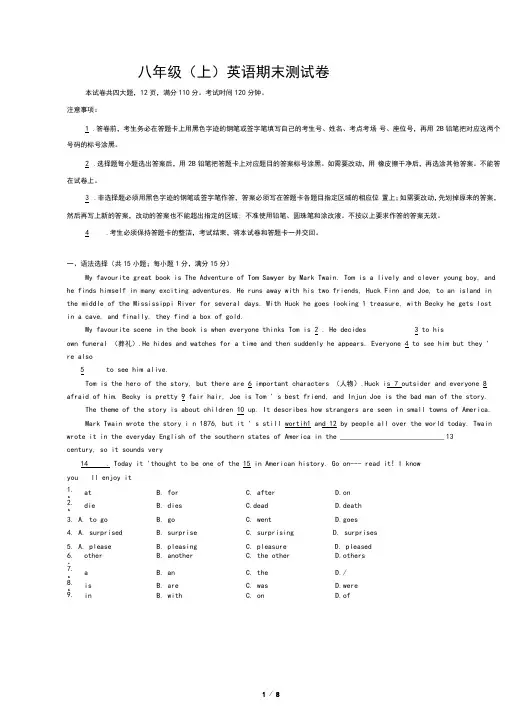
八年级(上)英语期末测试卷本试卷共四大题,12页,满分110分。
考试时间120分钟。
注意事项:1.答卷前,考生务必在答题卡上用黑色字迹的钢笔或签字笔填写自己的考生号、姓名、考点考场号、座位号,再用2B铅笔把对应这两个号码的标号涂黑。
2.选择题每小题选出答案后,用2B铅笔把答题卡上对应题目的答案标号涂黑。
如需要改动,用橡皮擦干净后,再选涂其他答案。
不能答在试卷上。
3.非选择题必须用黑色字迹的钢笔或签字笔作答,答案必须写在答题卡各题目指定区域的相应位置上;如需要改动,先划掉原来的答案,然后再写上新的答案,改动的答案也不能超出指定的区域; 不准使用铅笔、圆珠笔和涂改液。
不按以上要求作答的答案无效。
4.考生必须保持答题卡的整洁,考试结束,将本试卷和答题卡一并交回。
一、语法选择(共15小题;每小题1分,满分15分)My favourite great book is The Adventure of Tom Sawyer by Mark Twain. Tom is a lively and clever young boy, and he finds himself in many exciting adventures. He runs away with his two friends, Huck Finn and Joe, to an island in the middle of the Mississippi River for several days. With Huck he goes looking 1 treasure, with Becky he gets lost in a cave, and finally, they find a box of gold.My favourite scene in the book is when everyone thinks Tom is 2 . He decides 3 to hisown funeral (葬礼).He hides and watches for a time and then suddenly he appears. Everyone 4 to see him but they ' re also5to see him alive.Tom is the hero of the story, but there are 6 important characters (人物).Huck is 7 outsider and everyone 8 afraid of him. Becky is pretty 9 fair hair, Joe is Tom ' s best friend, and Injun Joe is the bad man of the story.The theme of the story is about children 10 up. It describes how strangers are seen in small towns of America.Mark Twain wrote the story i n 1876, but it ' s still wortih1 and 12 by people all over the world today. Twain wrote it in the everyday English of the southern states of America in the ____________________________ 13century, so it sounds very14 . Today it 'thought to be one of the 15 in American history. Go on--- read it! I knowyou 'll enjoy it too.1.A. atB. forC. afterD. o n2.A.die B. dies C.dead D. d eath3. A. to go B. go C. went D. g oes4. A. surprised B. surprise C. surprising D. surprises5. A. please B. pleasing C. pleasure D. pleased6.A. otherB. anotherC. the otherD. o thers7.A. aB. anC. theD. /8.A. isB. areC. wasD. w ere9.A.in B. with C. on D. o f10. A. grow B. grows C. grown D. growing11. A. read B. reading C. to read D. reads12. A. loves B. love C. loved D. loving13. A. nineteen B. nineteenth C. ninetieth D. ninth14. A. real B. really C. true D. truly15. A. great books B. greatest book C. greatest books D. great books二、完型填空(共10小题;每小题1.5分,满分15分)Swimming is very popular in summer. People like swimming in summer because water makes them16 cool. If you like swimming but swim in a 17 place, it may not be safe. These years, morethan ten people 18 while they were enjoying themselves in the water and 19 of them were students. But some people are 20 not careful. They often think they swim so 21 that nothing can happen to them in water. Summer is here again. If you go swimming in summer, don' forget 22better swimmers have died in water. They died because they were not careful, not because they 23 swim. So don ' t get into water when you are alone. 24 there is a Swimming sign, don ' waeerinto25.If you remember these, swimming will be safer.16. A. felt B. to feel C. feeling D. feel17. A. difficult B. wrong C. right D. small18. A. have died B. die C. died D. willdie19. A. much B. more C. lot D. most20. A. still B. already C. yet D. even21. A. well B. often C. fast D. hard22. A. what B. who C. which D. that23. A. needn ' t B. wouldn ' t C. couldn ' t D. mustn24. A. Because B. If C. Whether D. Though25. A. also B. nor C. either D. too三、阅读(共两节;满分45分)第一节阅读理解(共20小题;每小题2分,满分40分)A( ) 26. What do the Environment Clubs ask students to do?A.To run to school every day.B.To take exercise every day.C.Not to forget to take cars.D.Not to throw away lunch bags.( ) 27. How many ways does the passage mention to make less pollution?A. One.B.Two.C. Three.D. Four.( ) 28. Who will take a car to school on a no-car day?A. Both students and teachers.C.Only students.D.Only teachers.D. N either students nor teachers.( ) 29. How much water can some toilets waste in half an hour according to the passage?A. 20-40 m3.B.10-20 m3.C.5-10 m3.D. 15-30 m3.( )30. What ' s the purpOSe( of the passage?A.To ask students to clean school.B.To ask students to make less pollution.C.To ask student to join the Environment Club.D.To ask students to help teachers.BCarrie was in Grade Four in a small school in a big city. She liked going to school, but she was having a hard time in Maths class. They gave her problems like this: 3 + 22 >(1+8). She thought the answer was 33, but the teacher said it was wrong.She had to learn the order of operations (运算顺序) to get her answers right. But Carrie couldn ’ t remember all of the operations in the right order. She always forgot them, and her teacher wanted to help her. So her teacher taught her a trick.The trick was that she just had to remember a silly sentence. The sentence was: Please Excuse My Dear Aunt Sally. How did this strange sentence help with the order of operations? Each word stood for an operation, and they helped her remember the order. The first letter of each word went with the first letter of an operation.Here is how it worked:(P)lease —Parentheses (圆括号) always go first (E)xcuse —Exponents (幂) and roots (根) next (M)y—Multiplying and (P)ear —dividing third from left to right(A)unt —adding and (S)ally —subtracting ( 减去)last from left to rightNow Carrie remembered how to do Maths in order! She found that the answer was actually:3 + 22x (1+8) = ?3 + 22 x 9 = ?3+4x9 =? 3+ 36 =39.( )31. What was Carrie5 s problem?A. She had a hard time in Maths class.B.She wasn ' t good at language.C.She had a fight with her teacher.D.She couldn ' t talk with her parents.( )32. What did the teacher do to help Carrie remember?A. The teacher shouted at her.B.The teacher gave her more homework.C.T he teacher taught her a funny sentence.D.The teacher talked with her parents.( )33. Which was the right answer to the test problem?A.33.B.35.C.37.D.39.( )34. What went with subtracting in the story?A. Please.B. Excuse.C. Aunt.D. Sally.( )35. What does the passage mainly talk about?A.Carrie ' s borschool life.B.Remembering the order of operations.C.H ow to be good at Maths.D.Y ou can excuse your dear aunt.CTelevisions show sounds and pictures. People watch news and shows on them. You probably call them TVs.John Baird made the first TV in 1925. It had one color. It could only show 30 resolution (分辨率).This was just enough room for a face. It didn ' t work well, but it was a start.By the end of the 1930s, TVs were working well. America got its first taste at the 1939 WorldThere were 200 small, black and white TVs around the fair. The U.S. President gave a speech on the TVs. The TVs were only five inches big but people loved them. They wanted TVs. But World War II broke out during this time. Factories were busy making things for the war. When the war was over, TVs spread across the country.By 1948 there were 4 big TV stations in America. They gave their shows from 8 to 11 each night. Local shows were at other times. Most of the time, nothing was on at all. The TV was not it is now.Color TVs came out in the 1950s. They were too expensive. By 1965, color TVs were cheaper. TV stations started giving shows in color. People had to change their TVs to color TVs if they wanted to see the shows.( ) 36. Which is NOT true about the first TV?A.It could only show one color.B.It only had 30 resolution.C.It did not have sounds.D. It did not work well.( ) 37. What does the underlined part “ spread across ” mean?A. Were all over.B. Copied down.C. Grew up.D. Rushed out.( ) 38. Why was the year 1939 an important year for TVs?A.Because the first color TV came out.B.Because many Americans knew about TVs.C.Because the first TV station began working.D. Because John Baird made the first TV.( ) 39. How long did the TV shows last each night by 1948?A. For three hours.B. For two and a half hours.C. For two hours.D. For one and a half hours.( ) 40. What ’ s the best title for the passage?A.Some big TV stationsB.Why the TV became popularC. Please watch more TVD. The history of the TVDWhat do you do when you feel unhappy? Do you listen to music? Do you talk to a friend? Maybe next time you feel sad, you should try going outside, if it is sunny. Doctors know that how much sunlight we get can change how we feel. Scientists learnt this by interviewing people who live in different parts of the world. In the far north, in Alaskaor Finland, for example, the days are very short in winter. People living in these places say that they often feel unhappy in winter. In the south, where there are more daylight hours, fewer people say they are unhappy in winter. The reason is the amount of sunlight these people get each day. Sunlight changes the chemicals ( 化学物质) in our bodies, and these chemicals can change the way we feel.A couple of hours of strong sunlight or light from a special lamp can help your body produce the chemicals that make us feel happy. Mother way to feel happier is to get some exercise. Just like sunlight, regular ( 常规的) exercise helps our bodies make certain chemicals, which make us feel happier. In addition, exercise helps people sleep better and jack of sleep often makes people feel unhappy. Exercise also helps you get away from stress (压力) .When you are angry or upset about something, exercise is a good way to get those bad feelings out of you.( ) 41. Why do people in the far north feel unhappy more often than people in the south?A.Because they can ’ t go outside.B.Because they get less sunlight.C. Because the weather is too cold.D. Because the summer is too short.()42. How can sunlight change the way you feel?A.It allows you to play outside.B.It makes you less tired.C.It increases your body temperature.D.It helps your body make certain chemicals.()43. Exercise has the following functions (功能)EXCEPT.A.making people feel happierB.making people sleep betterC.helping people keep away from stressD.making people look younger()44. What can NOT make you feel happier according to the passage?A.Eating more.B.Exercising more.C.Getting more sleep.D.Getting more sunlight.()45. What ' s the main idea of the passage?A.Why sunlight is good for us.B.How exercise can help us.C.The way to feel happier.D.The advantages 驿处)of exercise.第二节阅读填空(共5小题;每小题1分,满分5分)Which university would you like to go to in the future? It ' s not too early to think about it right iStudents at Hilltop School had a University Week at the end of last month. 46 For instance, they designed a flag for a virtual(虚拟的)“University of Hilltop ".47He said he started the program to help students form their aims. a University may not be foreveryone, but we want the program to help students form their aims. " he said.48Eric, a student in Grade 8, said, a University Week made me realize that university is only four years away. I should do some research about where I want to go. " Paul, another student in Grhe realized that there so many universities for him to choose. 49The school also invited people to give career (职业)talks. The first talk was given by Captain Brown, a policeman. He talked about how to choose a career way. ________ 50 _________“The program o pened up the students ' eyes, “ said Mr. Miller.根据短文内容,选出五个句子填入文中空缺处,使短文内容完整正确。
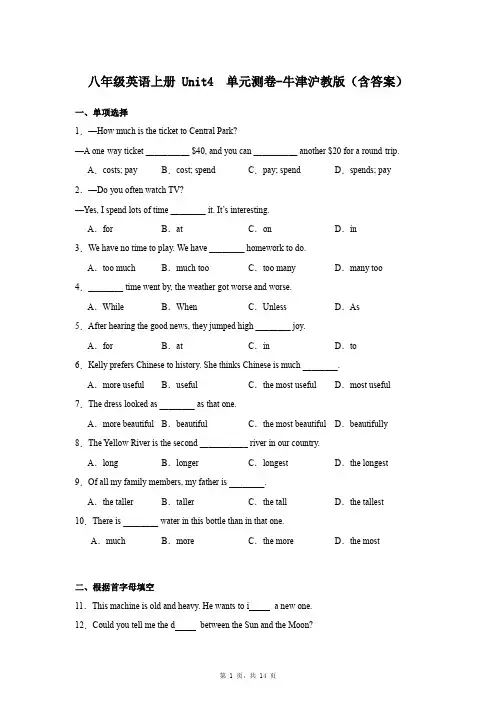
八年级英语上册 Unit4 单元测卷-牛津沪教版(含答案)一、单项选择1.—How much is the ticket to Central Park?—A one-way ticket __________ $40, and you can __________ another $20 for a round-trip.A.costs; pay B.cost; spend C.pay; spend D.spends; pay 2.—Do you often watch TV?—Yes, I spend lots of time ________ it. It’s interesting.A.for B.at C.on D.in3.We have no time to play. We have ________ homework to do.A.too much B.much too C.too many D.many too 4.________ time went by, the weather got worse and worse.A.While B.When C.Unless D.As5.After hearing the good news, they jumped high ________ joy.A.for B.at C.in D.to6.Kelly prefers Chinese to history. She thinks Chinese is much ________.A.more useful B.useful C.the most useful D.most useful 7.The dress looked as ________ as that one.A.more beautiful B.beautiful C.the most beautiful D.beautifully 8.The Yellow River is the second ___________ river in our country.A.long B.longer C.longest D.the longest 9.Of all my family members, my father is ________.A.the taller B.taller C.the tall D.the tallest 10.There is ________ water in this bottle than in that one.A.much B.more C.the more D.the most二、根据首字母填空三、完成句子四、用所给单词的正确形式填空五、汉译英:整句56.他的身体变得越来越强壮。
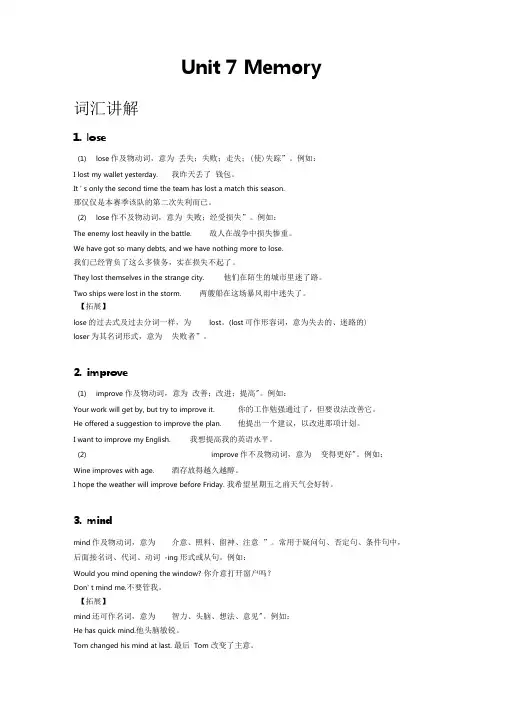
Unit 7 Memory词汇讲解1.lose(1)lose作及物动词,意为丢失;失败;走失;(使)失踪”。
例如:I lost my wallet yesterday. 我昨天丢了钱包。
It ' s only the second time the team has lost a match this season.那仅仅是本赛季该队的第二次失利而已。
(2)lose作不及物动词,意为失败;经受损失”。
例如:The enemy lost heavily in the battle. 敌人在战争中损失惨重。
We have got so many debts, and we have nothing more to lose.我们已经背负了这么多债务,实在损失不起了。
They lost themselves in the strange city. 他们在陌生的城市里迷了路。
Two ships were lost in the storm. 两艘船在这场暴风雨中迷失了。
【拓展】lose的过去式及过去分词一样,为lost。
(lost可作形容词,意为失去的、迷路的)loser为其名词形式,意为失败者”。
2.improve(1)improve作及物动词,意为改善;改进;提高"。
例如:Your work will get by, but try to improve it. 你的工作勉强通过了,但要设法改善它。
He offered a suggestion to improve the plan. 他提出一个建议,以改进那项计划。
I want to improve my English. 我想提高我的英语水平。
(2) improve作不及物动词,意为变得更好"。
例如:Wine improves with age. 酒存放得越久越醇。
I hope the weather will improve before Friday. 我希望星期五之前天气会好转。
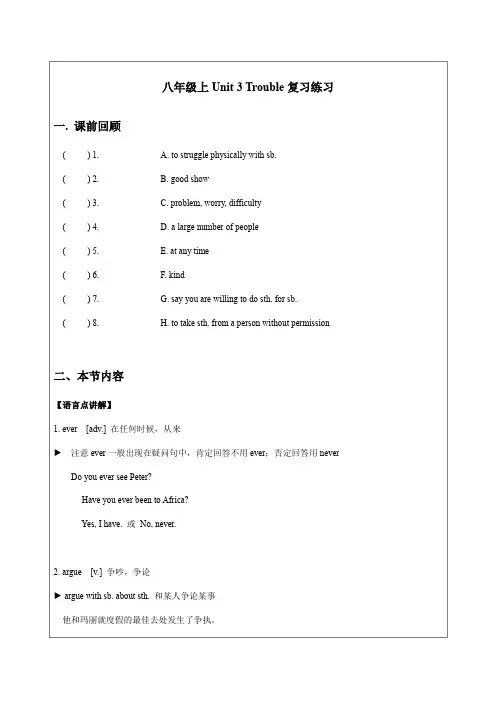
八年级上Unit 3 Trouble复习练习一. 课前回顾( ) 1. A. to struggle physically with sb.( ) 2. B. good show( ) 3. C. problem, worry, difficulty( ) 4. D. a large number of people( ) 5. E. at any time( ) 6. F. kind( ) 7. G. say you are willing to do sth. for sb.( ) 8. H. to take sth. from a person without permission二、本节内容【语言点讲解】1. ever [adv.] 在任何时候,从来►注意ever一般出现在疑问句中,肯定回答不用ever;否定回答用never Do you ever see Peter?--- Have you ever been to Africa?--- Yes, I have. 或No, never.2. argue [v.] 争吵,争论► argue with sb. about sth. 和某人争论某事他和玛丽就度假的最佳去处发生了争执。
He _______________________________________ the best place for their holiday.► [n.] 争吵,争论,辩论:_______________ = (近义词)_______________他们经常为钱的事发生争执。
They often _______________________________________.3. deal [v.] 过去式_______________,过去分词_______________► deal with sth. / sb. 处理你怎么处理麻烦? _______________________________________How do you _______________ the old books? = What do you _______________ the old books?4. trouble [n.] 问题,困难► have trouble (in) doing sth.= have difficulty (in) doing sth. 做某事有困难► [adj.] 讨厌的,麻烦的,困难的:_______________我们在找你所要的那本书时遇到了很多困难。
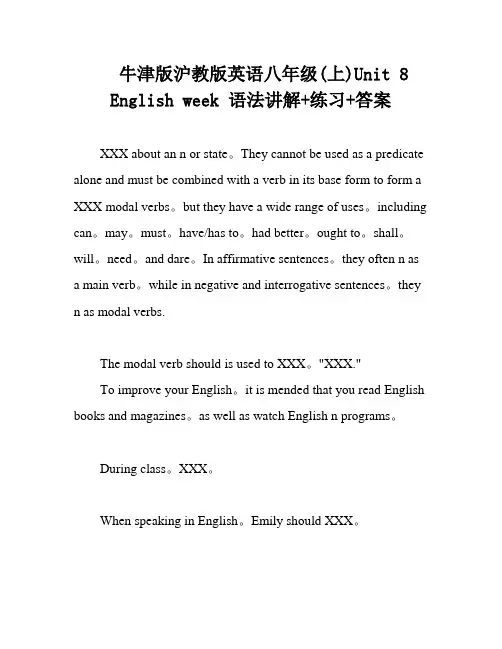
牛津版沪教版英语八年级(上)Unit 8English week 语法讲解+练习+答案XXX about an n or state。
They cannot be used as a predicate alone and must be combined with a verb in its base form to form a XXX modal verbs。
but they have a wide range of uses。
including can。
may。
must。
have/has to。
had better。
ought to。
shall。
will。
need。
and dare。
In affirmative sentences。
they often n as a main verb。
while in negative and interrogative sentences。
they n as modal verbs.The modal verb should is used to XXX。
"XXX."To improve your English。
it is mended that you read English books and magazines。
as well as watch English n programs。
During class。
XXX。
When speaking in English。
Emily should XXX。
XXX。
It is followed by the base form of a verb and its negative form is should not (shouldn’t)。
When used in a n。
should is placed at the beginning of the sentence。
It does not change for person or number。
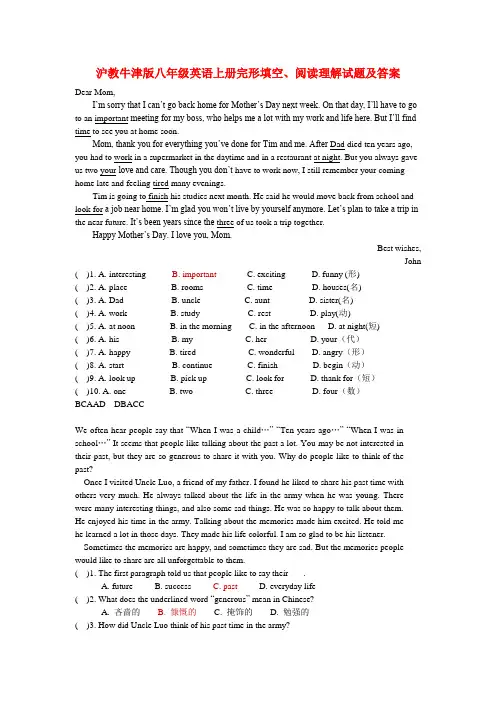
沪教牛津版八年级英语上册完形填空、阅读理解试题及答案Dear Mom,I’m sorry that I can’t go back home for Mother’s Day next week. On that day, I’ll have to go to an important meeting for my boss, who helps me a lot with my work and life here. But I’ll find time to see you at home soon.Mom, thank you for everything you’ve done for Tim and me. After Dad died ten years ago, you had to work in a supermarket in the daytime and in a restaurant at night. But you always gave us two your love and care. Though you don’t have to work now, I still remember your coming home late and feeling tired many evenings.Tim is going to finish his studies next month. He said he would move back from school and look for a job near home. I’m glad you won’t live by yourself anymore. Let’s plan to take a trip in the near future. It’s been years since the three of us took a trip together.Happy Mother’s Day. I love you, Mom.Best wishes,John ( )1. A. interesting B. important C. exciting D. funny (形)( )2. A. place B. rooms C. time D. houses(名)( )3. A. Dad B. uncle C. aunt D. sister(名)( )4. A. work B. study C. rest D. play(动)( )5. A. at noon B. in the morning C. in the afternoon D. at night(短)( )6. A. his B. my C. her D. your(代)( )7. A. happy B. tired C. wonderful D. angry(形)( )8. A. start B. continue C. finish D. begin(动)( )9. A. look up B. pick up C. look for D. thank for(短)( )10. A. one B. two C. three D. four(数)BCAAD DBACCWe often hear people say that “When I was a child…”“Ten years ago…”“When I was in school…” It seems that people like talking about the past a lot. You may be not interested in their past, but they are so generous to share it with you. Why do people like to think of the past?Once I visited Uncle Luo, a friend of my father. I found he liked to share his past time with others very much. He always talked about the life in the army when he was young. There were many interesting things, and also some sad things. He was so happy to talk about them.He enjoyed his time in the army. Talking about the memories made him excited. He told mehe learned a lot in those days. They made his life colorful. I am so glad to be his listener. Sometimes the memories are happy, and sometimes they are sad. But the memories people would like to share are all unforgettable to them.( )1. The first paragraph told us that people like to say their ___.A. futureB. successC. pastD. everyday life( )2. What does the underlined word “generous” mean in Chinese?A. 吝啬的B. 慷慨的C. 掩饰的D. 勉强的( )3. How did Uncle Luo think of his past time in the army?A. Bad.B. Stupid.C. Interesting.D. Dangerous.( )4. Why do people like to share their memories with others?A. Their stories are always happy.B. They feel tired.C. They are very sad now.D. The past memories are unforgettable.( )5. Which of the following is NOT true?A. Uncle Luo stayed in the army for some time.B. People only remember their happy time.C. Many people enjoy talking about their past time.D. Uncle Luo knows the writer’s father.Bill and Jill were going to visit Da-wei and Li-hua Wu in Taiwan for several days. Before they left America, Bill and Jill tried to learn about Chinese food and Taiwanese ways of doing things. They wanted to be polite. They learned that most people in Taiwan eat rice, drink tea, and take off their shoes when they go into a friend's apartment. Bill and Jill even learned to use chopsticks.At the same time, Da-wei and Li-hua learned about American food and American ways of doing things. They wanted to be friendly. When Bill and Jill came to the Wu's house, Da-wei and Li-hua told them to keep their shoes on. Later they went out for dinner. They ate pizza and drank Coke. The next few days, they had breakfast in a coffee shop and ate hamburgers in a fast-food restaurant.On their way back to America, Bill and Jill were thinking about why they never ate rice or drank tea or ate with chopsticks. They never took off their shoes when they visited the Wu family. They thought that living in Taiwan was just like living in America.( )1. A. reached B. stayed in C. moved to D. left( )2. A. he B. I C. They D. We( )3. A. drink B. grow C. sell D. eat( )4. A. make B. use C. buy D. break( )5. A. talked B. heard C. learned D. felt( )6. A. angry B. friendly C. excited D. happy( )7. A. school B. office C. house D. restaurant( )8. A. days B. minutes C. years D. centuries( )9. A. often B. usually C. sometimes D. never( )10. A. shirts B. blouse C. shoes D. socksACDBC BCADCBody language is an important part of communication. If you want to communicate well, it’s important to understand how you can (and can’t) use your body language to say what you mean, especially when you’re in a foreign country.If a person is bored, he won’t look at the person who is talking to him. He will find other things to do. He may also keep looking at his watch or a clock. If a person is open to you, his arms and legs will not be crossed. And if a person is relaxed, you will know it by looking at his body, even his breathing is slower.Here are some examples of body language.Body language FeelingSitting with legs crossed BoredSitting with legs apart Open, relaxedWalking with hands in pockets, head down SadHand to cheek Think about somethingHands clasped behind back AngryBACDB( )1. What can you do if you want to communicate well?A. Walk with hands in pockets.B. Use body language to say what you mean.C. Speak in public.D. Say something slowly.( )2. If a person is ___, he won’t look at the person who is talking.A. boredB. tiredC. happyD. open( )3. If a person is relaxed, ___.A. he will find other things to look atB. he will speak louderC. his breathing will be slowerD. his breathing will be quicker( )4. Which of the following is NOT true?A. Walking with head down, a person may sad.B. When a person was angry, his hands clasped behind back.C. Sitting with legs apart, a person may be open and relaxed.D. If a person is open to you, his arms and legs will be crossed.( )5. What is the best title for the passage?A. Communication.B. Body language.C. Some feeling.D. Health.BACDBOne day Kavya and I were playing football and the ball went into a man’shouse. We went to his house and asked him if he could give us our ball. He 1and we felt helpless.Suddenly, I noticed there was a water tank behind his house and I had a(n)2 . I looked at it and told Kavya to climb the water tank and jump over thegate.”Kavya agreed. She climbed down into the Takku’s house. I 3 and thenwe were looking under a bed for the ball.We 4 and took out the lost ball. But along with the ball was a gold bar!We 5 took the ball and climbed up the water tank again. When we reached Kavya’s house, the TV was on. It was 6 time.I couldn’t believe my 7 when it said that someone stole 20 gold bars were stolen from a gold shop. They showed a 8 of the gold bars and it was exactly like the one we had found.We quickly told the story to Kavya’s9 and she called the police. The police came at once and 10 the man. They found the gold bars in his house.( )1. A. agreed B. answered C. asked D. refused( )2. A. idea B. joke C. shame D. key( )3. A. looked at B. followed C. ran after D. heard( )4. A. pulled B. avoided C. hurried D. operated( )5. A. quickly B. slowly C. really D. clearly( )6. A. music B. story C. sport D. news( )7. A. eyes B. ears C. nose D. mouth( )8. A. music B. sound C. film D. picure( )9. A. father B. mother C. sister D. brother( )10. A. sent B. caught C. killed D. helpedYou may use the telephone every day but how much do you know about it? Alexander Bell made the first the telephone in 1876. Bell was born in Scotland in 1847. Later he went to live in the US. Alexander Bell was always interested in sound. He wanted to be able to send sound through a wire. He had a workshop in his house in America and did many experiments there.One day, while he was doing an experiment in his workshop, he was careles s and spilt some burning liquid onto his clothes. Talking into his telephone, Bell said: “Mr Watson, I want you to come over here immediately, please.” His assistant, Watson, was in another room far away from the workshop. However, he heard Bell clearly on his own telephone. Quickly, he ran to Bell’s workshop. “Mr Bell, I heard every work you said!” Watson shouted excitedly. Bell finally succeeded. He had invented the first telephone. Later other inventors made better ones.( )1. Which of the following is true?A. Bell made the first telephone in 1870s.B. Bell succeeded in making telephone after two experiments.C. Bell was the owner of a workshop in his house in Scotland.D. Bell discovered the telephone in 1847.( )2. What did Bell do many experiemnts for?A. To give a request to his assistant.B. To express feelings though musical instruments.C. To send sound through a wire.D. To hear his assistant’s voice.( )3. What did other inventors do later?A. Made telephones unpopular.B. Made telephones useless.C. Made telephones disused.D. Made telephones better.( )4. Where did Bell lived later?A. In Scotland.B. In the US.C. In New Zealand.D. In the UK.( )5. What did Bell have an interest in?A. musicB. physicsC. philosophyD. soundThe Best Thing About Maya’s BrotherIt was not a good morning for Maya. Everything was going wrong. First, she woke up late and had to get ready for school quickly. She didn’t have time to eat breakfast. And when she packed her school bag, she couldn’t find her ruler.“Let me help you,” said her brother, Abdul. He found her ruler on the floor. “Let’s run,” he said. “We will just make it.”But her problems weren’t over. She forgot to bring her homework and the teacher was not happy about that. The teacher gave her writing homework to do the next day. On the way home, it started to rain. She dropped her books on the ground as she got off the bus.Abdul got off the bus just behind her. “Don’t worry,” he said. “If we take them home and dry them quickly, they will be all right.”“Thanks, Abdul,” said Maya.That night Maya sat down to do her homework. But when she read the topic of the writing homework, she smiled. The teacher had written at the top of the page: “Write about your best friend. Explain what you like best about him or her.” She thought a while and started to write, “The best thing about my brother Abdul…”( )1. A. went to bed B. stood up C. woke up D. sat down( )2. A. breakfast B. lunch C. tea D. supper( )3. A. jump B. fly C. climb D. run( )4. A. angry B. happy C. sad D. satisfied( )5. A. rain B. snow C. be windy D. be cloudy( )6. A. repair B. finish C. dry D. broke( )7. A. Thanks B. Bye. C. Sorry. D. Pardon( )8. A. put B. lay C. sat D. looked( )9. A. cried B. smiled C. laughed D. shouted( )10. A. read B. listen C. speak D. writeCADBA CACBD。
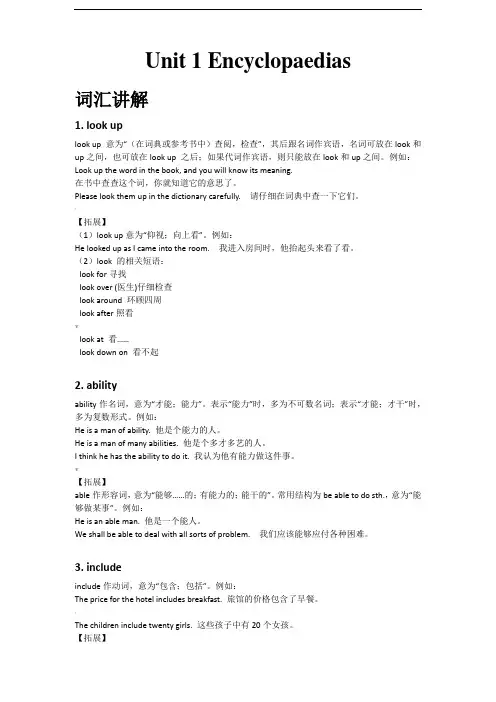
Unit 1 Encyclopaedias词汇讲解1. look uplook up 意为“(在词典或参考书中)查阅,检查”,其后跟名词作宾语,名词可放在look和up之间,也可放在look up 之后;如果代词作宾语,则只能放在look和up之间。
例如:Look up the word in the book, and you will know its meaning.在书中查查这个词,你就知道它的意思了。
Please look them up in the dictionary carefully. 请仔细在词典中查一下它们。
`【拓展】(1)look up意为“仰视;向上看”。
例如:He looked up as I came into the room. 我进入房间时,他抬起头来看了看。
(2)look 的相关短语:look for寻找look over (医生)仔细检查look around 环顾四周look after照看¥look at 看……look down on 看不起2. abilityability作名词,意为“才能;能力”。
表示“能力”时,多为不可数名词;表示“才能;才干”时,多为复数形式。
例如:He is a man of ability. 他是个能力的人。
He is a man of many abilities. 他是个多才多艺的人。
I think he has the ability to do it. 我认为他有能力做这件事。
¥【拓展】able作形容词,意为“能够……的;有能力的;能干的”。
常用结构为be able to do sth.,意为“能够做某事”。
例如:He is an able man. 他是一个能人。
We shall be able to deal with all sorts of problem. 我们应该能够应付各种困难。
3. includeinclude作动词,意为“包含;包括”。
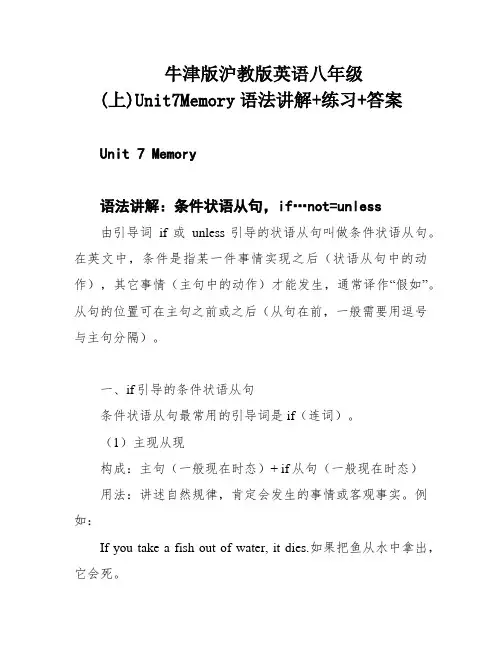
牛津版沪教版英语八年级(上)Unit7Memory语法讲解+练习+答案Unit 7 Memory语法讲解:条件状语从句,if…not=unless由引导词if或unless引导的状语从句叫做条件状语从句。
在英文中,条件是指某一件事情实现之后(状语从句中的动作),其它事情(主句中的动作)才能发生,通常译作“假如”。
从句的位置可在主句之前或之后(从句在前,一般需要用逗号与主句分隔)。
一、if引导的条件状语从句条件状语从句最常用的引导词是if(连词)。
(1)主现从现构成:主句(一般现在时态)+ if从句(一般现在时态)用法:讲述自然规律,肯定会发生的事情或客观事实。
例如:If you take a fish out of water, it dies.如果把鱼从水中拿出,它会死。
If you put a piece of paper into water, it gets wet.如果你把一张纸放进水中,它会变湿。
If you put salt into water, it disappears.如果你把盐放入水中,它会消失。
If you heat ice, it turns into water.如果你加热冰块,它会变成水。
Steam turns into water if you cool it.如果你冷却水蒸气,它会变成水。
Oil floats if you pour it on water.如果你把油倒入水中,它会漂浮。
(2)主将从现、主祈从现、主情从现组成:主句(普通未来时态、祈使句、神态动词)+ if从句(普通目前时态)用法:评论未来大概会产生的情形。
比方:①I’ll buy a car if I have enough money.假如我有充足的钱,我会买一辆车。
They won’t go out if it rains heavily tomorrow.假如明世界大雨,他们不会外出。
②Be careful when you cross the road.过马路时要谨慎。
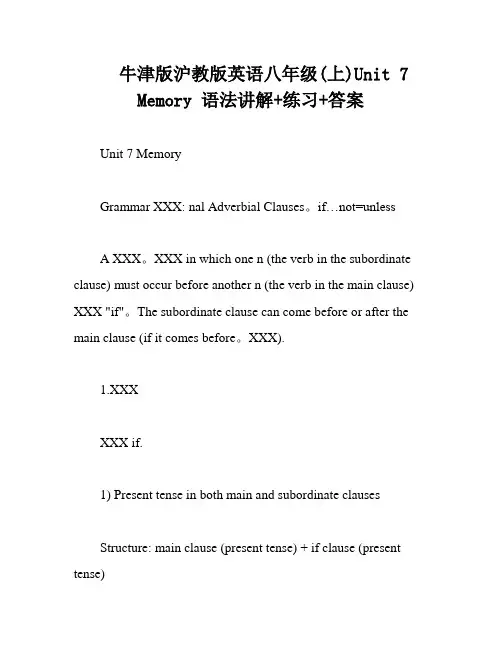
牛津版沪教版英语八年级(上)Unit 7 Memory 语法讲解+练习+答案Unit 7 MemoryGrammar XXX: nal Adverbial Clauses。
if…not=unlessA XXX。
XXX in which one n (the verb in the subordinate clause) must occur before another n (the verb in the main clause) XXX "if"。
The subordinate clause can come before or after the main clause (if it comes before。
XXX).1.XXXXXX if.1) Present tense in both main and subordinate clausesStructure: main clause (present tense) + if clause (present tense)Usage: to describe natural laws。
XXX will definitely XXX。
XXX:If you take a fish out of water。
it dies.If you put a piece of paper into water。
it gets wet.If you put salt into water。
it disappears.If you heat ice。
it turns into water.Steam turns into water if you cool it.Oil floats if you pour it on water.2) Future tense in main clause。
present tense in subordinate clause。
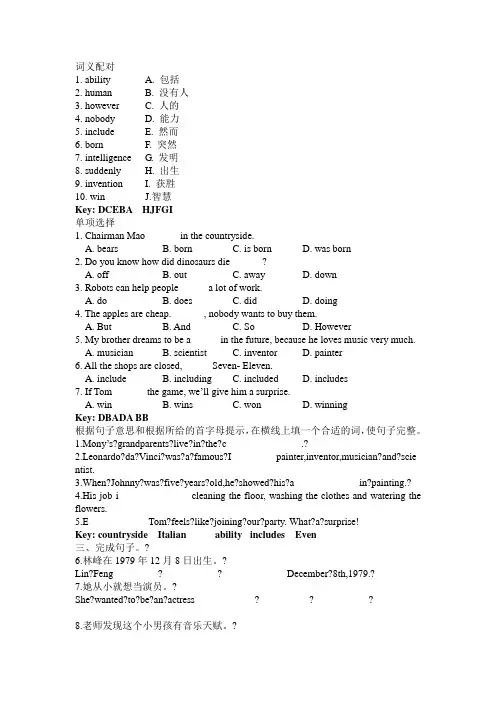
词义配对1. ability A. 包括2. human B. 没有人3. however C. 人的4. nobody D. 能力5. include E. 然而6. born F. 突然7. intelligence G. 发明8. suddenly H. 出生9. invention I. 获胜10. win J.智慧Key: DCEBA HJFGI单项选择1. Chairman Mao ______ in the countryside.A. bearsB. bornC. is bornD. was born2. Do you know how did dinosaurs die ______?A. offB. outC. awayD. down3. Robots can help people _____ a lot of work.A. doB. doesC. didD. doing4. The apples are cheap. ______, nobody wants to buy them.A. ButB. AndC. SoD. However5. My brother dreams to be a _____ in the future, because he loves music very much.A. musicianB. scientistC. inventorD. painter6. All the shops are closed, _____ Seven- Eleven.A. includeB. includingC. includedD. includes7. If Tom ______ the game, we’ll give him a surprise.A. winB. winsC. wonD. winningKey: DBADA BB根据句子意思和根据所给的首字母提示,在横线上填一个合适的词,使句子完整。
⽜津版沪教版英语⼋年级(上)Unit8Englishweek语法讲解+练习+答案Unit 8 English week语法讲解:情态动词(should和had better)情态动词(Modal verbs)本⾝有⼀定的词义,表⽰语⽓的单词。
但是不能独⽴作谓语,只能和动词原形⼀起构成谓语。
情态动词⽤在⾏为动词前,表⽰说话⼈对这⼀动作或状态的看法或主观设想。
情态动词虽然数量不多,但⽤途⼴泛,主要有下列:⼀、情态动词should的⽤法【教材典句】1. You should communicate in English with your friends whenever you can.2. You should read English books and magazines, and watch English television programmes.3. She told the class that they should study hard for the next exam.4. Emily should pronounce her words more clearly when she speaks in English.以上四个句⼦,主要围绕着情态动词should的⽤法展开,形象鲜明地展现了should的⽤法。
【语法全解】Should为情态动词,意为“应该”,后接动词原形,其否定形式为shouldn’t,变为⼀般疑问句时,should提到句⾸。
⽆⼈称和数的变化。
其⽤法如下:1. 否定形式should not(shou ldn’t)意为“不应该;不应当”You shouldn’t sit in the sun all day.你不应该整天坐在太阳底下。
They shouldn’t spend too much money.你不应该花太多钱。
2. 常⽤I should或we should表达“对⾃⼰⽽⾔该做些什么”I should go home. It’s midnight.我该回家了。
广州沪教牛津版八年级英语上册期末试卷八年级英语满分:90分时间:100分钟注意事项:1.答卷前,考生务必在答题卡上用黑色钢笔或签字笔填写自己的考生号、姓名、试室号、座位号,再用2B铅笔把对应的号码涂黑。
2.选择题每小题选出答案后,用2B铅笔把答题卡上对应题目的答案标号涂黑。
如需要改动,用橡皮擦干净后,再选涂其他答案,不能答在试卷上。
3.非选择题必须用黑色字迹的钢笔或签宇笔作答,答案必须写在答题卡各题目指定区域的相应位置上;如需要改动,先划掉原来的答案,然后再写上新的答案,改动的答案也不能超出指定的区城;不准使用铅笔、圆珠笔和涂改液。
不按以上要求作答的答案无效。
4.考生必须保持答题卡的整洁;考试结束,将答题卡交回。
一、语言知识及运用(共两节,满分15分)第一节单项选择(共10小题;每小题0. 5分,满分5分)从各题所给的A、B、C和D项中,选出可以填入空白处的最佳选项,并在答题卡上将该项涂黑。
1.— Is there ________ in the classroom?— No, I can see ________ there.A. anybody; somebodyB. somebody; anybodyC. nobody; anybodyD. anybody; nobody2.Our city will become more and more beautiful ________ we try our best to protect it.A. unlessB. ifC. soD. but3.You had better ________ more time practising your spoken English in your free time.A. spendB. to pendC. spendingD. spent4.— What do you think of the movie The Battle at Lake Changjin?—Wonderful. I’ve never seen a movie ________ than it.A. more excitedB. more excitingC. most excitedD. most exciting5.— Have you ever ________ to Shanghai?— Yes, I have. I ________ there three years ago with my parents.A. travel; goB. travelled; goC. travelled; goneD. travelled; went6.It’s my ________ time to visit the Canton Tower. It’s a wonderful experience for me.A. oneB. the oneC. firstD. the first7.There are ________ books in the library. You can borrow some to read.A. thousand ofB. thousands ofC. five thousandsD. five thousands of 8.I’ve worked as a teacher in this school ________ 10 years ________ 2011.A. since; forB. for; sinceC. for; forD. since; since9.The weather in Guangzhou in winter is ________ cold ________ that in Beijing.A. as; asB. so; asC. not as; asD. not as; like 10.— Rebecca, ha ve you read today’s morning paper?—Not ________. What’s the latest news about our Chinese astronauts?A. neverB. everC. justD. yet第二节语法选择(共10小题;每小题1分,满分10分)阅读下面短文,按照句子结构的语法性和上下文连贯的要求,从11~20 各题所给的A、B、C和D 项中选出最佳选项,并在答题卡上将该项涂黑。
Unit 3 Computers词汇讲解1. orderorder作及物动词,意为“点菜,订购”。
其后可接双宾语,即order sb. sth. = order sth. for sb. 例如:I want to order you a suit. = I want to order a suit for you. 我想给你订套衣服。
【拓展】(1) order作动词,意为“命令,指挥,要求”。
例如:The police ordered them to wait right there. 警察命令他们就在那里等待。
(2) order作名词,意为“顺序,次序;命令,指示或点菜”。
例如:Please put these sentences in the correct order. 请按正确的顺序排列这些句子。
She gave orders for the work to be started. 他命令开始工作。
May I take your order? 可以点菜吗?2. seem(1)seem是系动词,它的意思是“似乎,仿佛”,后面用that或者as if引导的从句作表语,主语常用it。
例如:It seems as if it is going to rain. 天好像要下雨。
It seems that he likes his new job. 他看起来很喜欢他的新工作。
(2)seem的后面还可用“动词不定式、名词、现在分词、过去分词或者to be+形容词”作表语。
例如:He seems to laugh at us. 他仿佛在嘲笑我们。
He seems(to be)ill.他似乎病了。
3. compare(1)compare作动词,意为“比较,对照”,常与with连用。
例如:Compare your answers with those at the back of the book to see if they are right.把你的答案同书后面的答案对照一下,看看是否正确。
初中英语八年级上Unit 1 Encyclopaedias单元测试题笔试部分(80分)一、单项选择(20分)(1)从下面每小题的A、B、C三个选项中选出可以替代划线部分的最佳选项。
(共5小题,每小题1分)( ) 11. —Is the supermarket still open now?—Perhaps not. It closes at 6:00 p.m. on Mondays.A. EvenB. MaybeC. Often( ) 12. —Dinosaurs all died out about 650 million years ago.—Do scientists know the reason?A. disappearedB. went outC. came out( ) 13. —I think the young man has the ability to finish the work alone.—I agree.A. decides toB. used toC. is able to( ) 14. —Congratulations! You won the 100-metre race.—Thank you.A. did best inB. failed toC. worked hard at ( ) 15. —How long will Tony and his friends stay in Shenzhen?—They will stay for more than 40 days.A. at leastB. overC. almost(2)从下面每小题的A、B、C三个选项选出可以填入空白处的最佳选项。
(共5小题,每小题1分)( ) 16. A __________ is a person who studies one or more of the natural sciences.A. musicianB. scientistC. visitor( ) 17. __________ refers to the ability to learn, understand and think in a good way about things.A. ResponsibilityB. ResponseC. Intelligence( ) 18. —Why did Linda cry just now?—__________ knows why. You can ask Linda.A. SomebodyB. NobodyC. Everybody( ) 19. —Simon, could you please help me __________ on the Internet when the plane will take off?—I’m sorry, my computer doesn’t work.A. find outB. look outC. put out( ) 20. —I have passed my driving test.—__________. So you are going to buy a car.A. Good ideaB. CongratulationsC. That’s right二、完形填空(10分)My frie nd’s g randfather came to America from a farm in Thailand. After 21 in New York, he went into a cafeteria (自助餐厅) in Manhattan to get 22 to eat. He sat down at an empty table and waited for someone to take his order. Of course, 23 did. 24 a woman with a big pl ate 25 food came up to him. She sat down 26 him and told him how a cafeteria worked.“Start out at that end,”she said, “Just go along the line and pick out what you want. At the other end they’ll tell you 27 you have to pay.“I soon learn ed tha t’s how everything works in America,”the grandfather told my friend later.“Life is li ke a c afeteria here. You can get everything you want so long as you want 28 the price. You can even get success, but you’ll never get it if you 29 some one to bring it to you. You have to stand up and get it by 30 .”( ) 21. A. arriving B. arrived C. reaching( ) 22. A. nothing B. something C. anything( ) 23. A. everything B. anybody C. nobody( ) 24. A. Finally B. Luckily C. firstly( ) 25. A. without B. full of C. filling with( ) 26. A. at B. from C. opposite( ) 27. A. how many B. how much C. how often( ) 28. A. to pay B. to spend C. to take( ) 29. A. wait B. wait for C. hope( ) 30. A. waiter B. others C. yourself三、阅读理解(10分)Leonardo da Vinci was born on April 15, 1452 in Italy. He is best known as an artist today. One of his famous paintings is called Mona Lisa. However, Leonardo had many other natural abilities. He was also a great inventor(发明家). Many of his inventions have become important in modern day life.Although Leonardo hated war, he invented many different machines used for war. His most special invention was the machine gun(枪), which was produced and used in war many years later.By watching the way birds fly, Leonardo tried to find out the secret of flying. Among his sketches(素描)we can see several objects. We consider them as modern flying machines.Leonardo spent many hours thinking about how to make good use of time. He developed ideas for labor-saving machines like cutting machines.Leonardo was a strange man. He didn’t eat any meat, which was very unusual in those times. He never published(发表)his ideas and scientific discoveries. He usually used mirror writing, which looks like writing a mirror, starting from the right side of the page and moving to the left.We have very little of his work today. Leonardo finished only a few of his paintings. He left many unfinished because he thought they were not perfect. No one in his life time knew how great Leonardo was. We now believe, however, that he was one of the cleverest men the world has ever known.31. According to the passage, Leonardo is not only an artist but also _______.A. an inventorB. an engineerC. a writerD. a musician32. _______ was Leonardo’s most special invention.A. The mirror writingB. The cutting machineC. The machine gunD. The flying machine33. Leonardo was strange, for example, _______.A. he didn’t eat any vegetablesB. he usually used mirror writingC. he liked to publish his discoveriesD. he enjoyed drawing flying machines34. Leonardo invented some machines to _______.A. stop the warB. help paint picturesC. watch the birdsD. make good use of time35. From the passage, we can learn that Leonardo was very _______.A. humorousB. seriousC. cleverD. lonely第Ⅱ卷(共50分)四、词汇运用(10分)(1)根据句意和首字母或汉语提示完成句子(5分)36. We will have an i________ test next Friday.37. Edison was a great s_______.38. N________ knows how many stars there are in the sky.39. I _______(突然)realized there was someone following me.40. My aunt bought me a n_______(笔记本)computer as a birthday gift yesterday.(2)用所给词的适当形式填空(5分)41. It is useful _______ (learn) a foreign language.42. Can you help me _______ (carry) the box, Lily?43. Remember _______ (write) to me when you get to Beijing.44. I need some _______ (potato). Do you have any?45. About two _______ (million) people listened to the programme.五、完成句子(10分)46. 为什么这种生物灭绝了?Why did such kind of living things _____ ______?47. 让我们去公园散步吧!Let's _______ _______ _______ in the park!48. 我爸爸过去常常在河边钓鱼。
Unit 4 Inventions词汇讲解1. createcreate作动词,意为“创造,创作,创建”。
God creates human beings. 上帝创造了人类。
An artist should create beautiful things. 一个艺术家应该创造美丽的东西。
It is people who create history. 是人民创造了历史。
【拓展】creative作形容词,意为“有创造性的,有创意的”。
Yoga releases the creative potential in life. 瑜伽释放出生命中创造的潜力。
Pay close attention to your own creative ideas. 时刻关注自己创造性的想法。
2. telephonetelephone是可数名词,意为“电话,电话机”,其缩写形式为phone。
例如:I don’t have a telephone. 我没有电话。
Tony often talks with me on the telephone. Tony经常和我电话交谈。
【拓展】(1) telephone还可用作动词,意为“打电话”。
例如:I telephone my grandma every week. 我每周都给我奶奶打电话。
(2) 给某人打电话的表达:1) telephone/phone sb. 例如:I often telephone/phone my parents on weekends. 周末我经常给父母打电话。
2) call sb. (up) 例如:Please call me (up) this evening. 请今晚给我打电话。
3) give sb. a call 例如:Please give me a call when you get home. 请你到家后,给我打个电话。
4) make a telephone call to sb. 例如:My best friend often makes a telephone call to me. 我最好的朋友经常给我打电话。
【最新整理,下载后即可编辑】沪教牛津版八年级英语上册U1 练习题一词汇积累1. P_____ you are right, but we don’t know for sure.2. The South China Sea Islands i_____ over 200 islands.3. What a hot day! The weather report says it will be e_____ hotter tomorrow.4. It’s raining hard. H_____ , I still want to go there.5. I knocked at the door, but n_____answered. Maybe they were all out.三根据中文意思完成句子。
1. 我2001年出生,现在15岁。
I _____ _____ _____ 2001 and I’m 15 years old now.2. 在市中心停车是很困难的。
Parking is difficult _____ _____ _____ _____ the city.3. 我必须在这个月底完成这个项目。
I must finish the project _____ _____ _____ _____ thismonth.4. 我们可以通过这本书来了解欧洲历史。
We can the history of _____ _____ Europe _____ thisbook.5. 我们应该保护那些濒危动物,不然它们很快就会灭绝。
We should protect the animals in danger, or they will __________ soon.6. 我也不知道这个词的意思,你可以在词典里查找。
I don’t know the meaning of this word either. You can _____ _____ _____ in a dictionary.7. 这个箱子和那个一样重。
沪教牛津版八上练习及答案集团标准化小组:[VVOPPT-JOPP28-JPPTL98-LOPPNN]词义配对1. ability A. 包括2. human B. 没有人3. however C. 人的4. nobody D. 能力5. include E. 然而6. born F. 突然7. intelligence G. 发明8. suddenly H. 出生9. invention I. 获胜10. win J.智慧Key: DCEBA HJFGI单项选择1. Chairman Mao ______ in the countryside.A. bearsB. bornC. is bornD. was born2. Do you know how did dinosaurs die ______?A. offB. outC. awayD. down3. Robots can help people _____ a lot of work.A. doB. doesC. didD. doing4. The apples are cheap. ______, nobody wants to buy them.A. ButB. AndC. SoD. However5. My brother dreams to be a _____ in the future, because he loves music very much.A. musicianB. scientistC. inventorD. painter6. All the shops are closed, _____ Seven- Eleven.A. includeB. includingC. includedD. includes7. If Tom ______ the game, we’ll give him a surprise.A. winB. winsC. wonD. winningKey: DBADA BB根据句子意思和根据所给的首字母提示,在横线上填一个合适的词,使句子完整。
1.Mony’s?grandparents?live?in?the?c_______________.?2.Leonardo?da?Vinci?was?a?famous?I_________painter,inventor,musician? and?scientist.3.When?Johnny?was?five?years?old,he?showed?his?a_____________in?paint ing.?4.His job i______________ cleaning the floor, washing the clothes and watering the flowers.5.E____________Tom?feels?like?joining?our?party. What?a?surprise! Key: countryside Italian ability includes Even三、完成句子。
?6.林峰在1979年12月8日出生。
?Lin?Feng_________?___________?_____________December?8th,1979.?7.她从小就想当演员。
?She?wanted?to?be?an?actress____________?__________?___________?______ ______8.老师发现这个小男孩有音乐天赋。
?The?teacher?finds?the?little?boy_________?___________?___________?___ ________.?9.我的父母喜欢住乡下,可是我喜欢住大城市。
?My?parents?likes?to?live________?________?_________,but?I?like?to?liv e?in?a?big?city.?10.我过去常常在旅游时带着一个笔记本。
?I?used?to__________?__________?___________when?I?went?travelling. Key: was born on; from an early age; has a musical ability; in the countryside; keep a notebook语法专练1. There isn’t _____ in the classroom.A. someoneB. anyoneC. no oneD. any people2. Listen! Someone ____ singing in the next room.A. beB. isC. areD. were3. Mom, we don’t have _____ bread in the fridge.A. oneB. noC. someD. any4. —Would you like ______ to drink? —Coffee is OK.A. somethingB. anythingC. nothingD. everything5. —Do you have _____ oranges? —Yes, we have _____ oranges.A. some; someB. any; someC. any; anyD. some; any6. I didn’t find _____ on my table.A. somethingB. anythingC. nothingD. everything7. —Jack, is there _____ in today’s newspaper? —No, nothing.A. anything importantB. something importantC. important anythingD. important something8. Our teacher always tried to teach us _______ from the book.A. different somethingB. different anythingC. something differentD. anything different9. Lily has nothing to do in the morning. Let me give her _____ to do.A. somethingB. anythingC. nothingD. everything10. There ______ somebody knocking at the door. Please go and see who it is.A. beB. amC. areD. isKey: BBDAB BACAD用括号内的词填空1. It is difficult to live without _____ money. (some/ any)2. We have _____ bread, but we don’t have ______ milk in the fridge. (some/ any)3. Doesn’t ______ know the answer to this question? (someone/ anyone)4. We are going to do _______cleaning in the morning. (some/ any)5. Is there ____________ I can do for you, Sir? (something/ anything)6.—Would you like ________ coffee? (some/ any) —Yes, please.7.—Is there ________ apple juice at home?—Yes, there is _________. (some/any)8. I can’t find my socks _____________. (somewhere/ anywhere)9. I didn’t see ______________ in the house. (someone/ anyone)10. The boy didn’t say ___________ in the meeting. (something/ anything)Key: 1. any 2.some; any 3. anyone 4.some 5. anything 6. some 7. any; some 8. Anywhere 9. anyone 10. anything完型填空Television plays an important part in our daily life. Children enjoy watching TV. Some ___1___ are happy about that because it stops their children from playing with dangerous things. Watching TV can help your children __2____ about lots of things, such as music, other countries, and many other things. They will learn much more about the outside world.However, it’s ___3__ to say that watching TV doesn’t do harm to children. You can’t let them watch TV as __4___ as they want. Watching TV takes up a lot of time. Children need to ___5___ the world by themselves, not just from TV. Besides, children need to move around and do lots of __6____. Sitting on the chairs and watching TV too much will make children become fatter. It is __7___ worse when the TV programs are ___8___ of violent scenes (暴力场景). These things are bad for children.As parents, you should choose the right programs for them, and shouldn’t leave the TV on all day. Turn it off right after their programs __9____. Never put a TV in your children’s ___10__.1. A. parents B. schools C. teachersD. students2. A. look B. forget C. thinkD. learn3. A. wrong B. friendly C. rightD. careful4. A. much B. many C. littleD. few5. A. look B. invent C. knowD. watch6. A. sports B. homework C. partiesD. programs7. A. very B. so C. tooD. even8. A. fond B. full C. proudD. afraid9. A. go B. come C. beginD. end10. A. school B. room C. classroomD. homeKey: ADAAC ADBDB阅读理解Shane is a man from space. He thinks the people and things onthe earth are very strange. He is now writing a letter to his friendat home. Here is part of his letter. Read it and answer the questions.Now I am in a strange world. It is very nice. There are many new things here. There are many earth monsters here, too. The earth monsters look very funny. They have just one head, two arms and two legs. They have thin black strings(线) on their heads. Some earth monsters have brown or yellow strings. The earth monsters have a hole in their face. Every day, they put nice things and balls from thetrees into the hole. They put water into the hole, too. The earth monsters do not walk very fast. They move from place to place in tin boxes.At night, the earth monsters like to look at a square window box. This box has very small earth monsters in it.根据短文内容,选择正确答案。